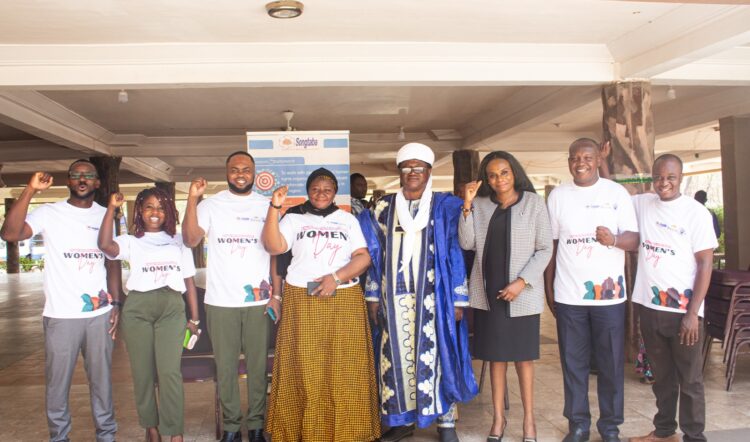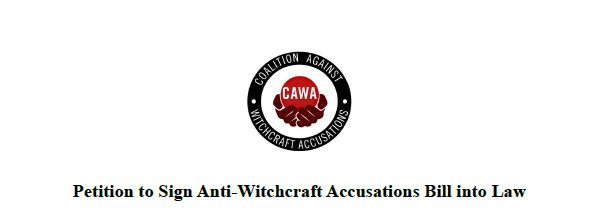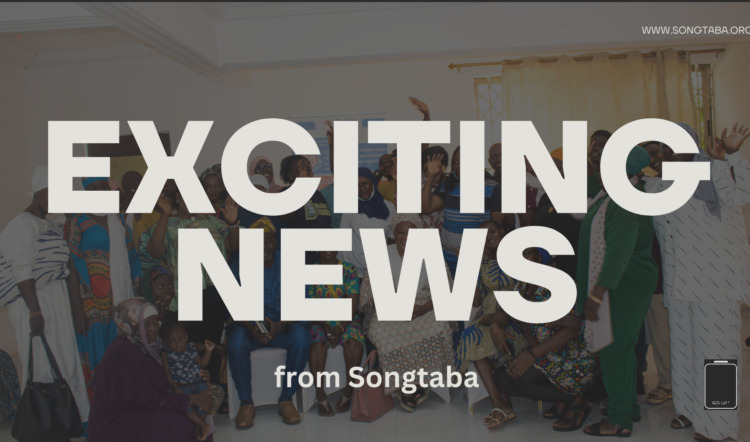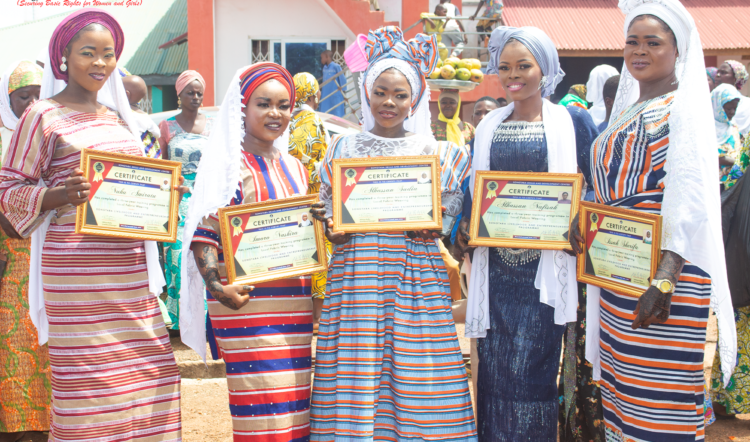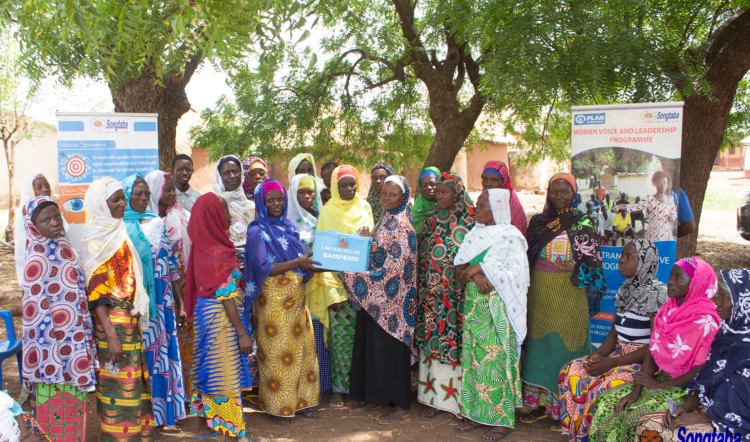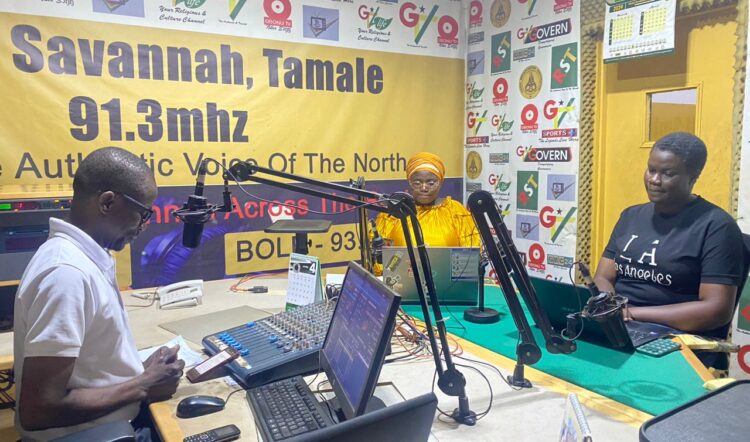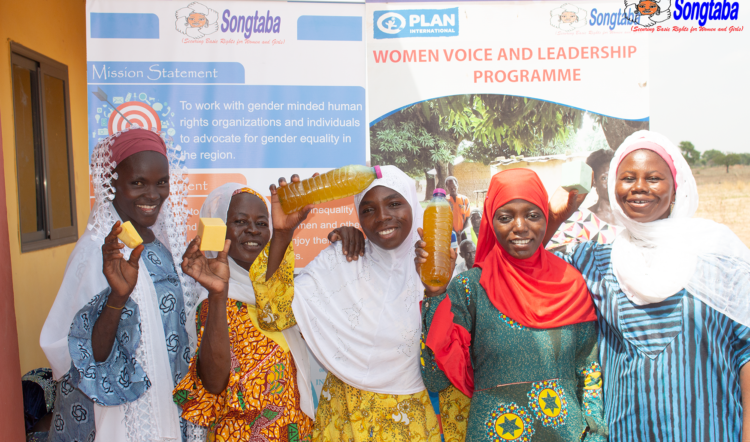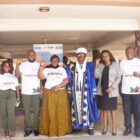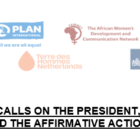Petition to Sign Anti-Witchcraft Accusations Bill into Law (Coalition Against Witchcraft Accusations)
For too long, citizens, especially older women, have been victimized by witchcraft accusations in
our country. This deep rooted and widespread practice has led to untold suffering, discrimination,
and violence. The practice of witch-hunting and witchcraft accusations is extremely harmful. Just
mere accusations break up families, the foundational unit of society; destroy lives and livelihoods,
and serve as a generational sentence of stigma and suspicion on families. Above all, witch-hunting
is based on a deadly phenomenon as we’ve witnessed the murder, lynching and brutalization of
defenseless victims, mainly older women, on regular basis. While a few of these are reported,
many attacks and murders go unreported, especially in the rural parts of Ghana.
* Exciting News!!! Songtaba launched PROJECT BRIDGE – Building Rights, Information, and Delivery of Gender-Equitable SRHR
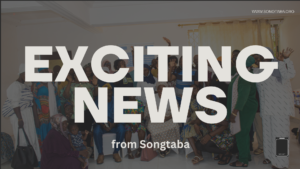
GRADUATION CEREMONY FOR 5 YOUNG LADIES
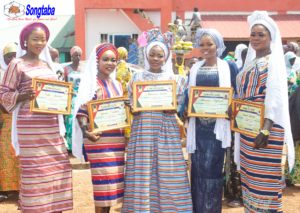
VSLA 2.0 (VILLAGE SAVINGS AND LOANS ASSOCIATION) MODEL
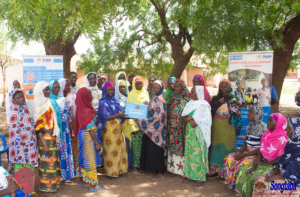
Songtaba, with support from Plan International Ghana under The women voice and leadership programme made a visit to Zugu, a community in the Kumbungu District to check in with the VSLA group in the community and also introduce them to the VSLA 2.0 model, the discussion included the women talking about the benefits and challenges of the group for the past two years.
After two years being in a VSLA group, the women in the Zugu community share their experiences;
According to the members, saving money was a challenge for them individually before they joined the group which hindered their ability to provide the basic necessities for themselves and their kids. However after Joining the group they have been able to save and can take care of their children and emergency cases, and even go further to take loan from the group . Being part of the group makes them feel a sense of belonging, they have found a community of friends and sisters that they can rely on for advice than individuals. .
Why VSLA (“Adakah Bila”) women should Invest their Savings.
What is a VSLA Group aka “Adakah Bila”
The village savings and loans associations is an initiative that seeks to support rural women to save regularly in small flexible amounts, access loans to invest in their business and other endeavors like agriculture and also access emergency support through a basic insurance fund.
A typical VSLA group comprises of 15 – 25 members from within a community who meet regularly (monthly, weekly, bi-weekly, bi-monthly) to save their money in a safe place. These groups save their monies in a fund from which they can borrow money as needed and repay with interest. At the end of a set operating cycle (of generally about one year), the entire fund with interest earned is distributed to members according to the amount each has saved in the group. Groups typically then begin the cycle again.
See FAQs on VSLA at: https://www.care.org/our-work/education-and-work/microsavings/vsla-101/
VSLA Groups Investing Their Savings
How do we ensure that the fund grows bigger beyond loan interests and regular savings, the second phase of the VSLA model/initiative suggests that the women use the money in their saving funds to invest in group business ventures as a collective. There are so many opportunities or businesses that these groups can venture into; chair rentals, construction materials rentals, selling soap products and services.
On the 20th of April, 2024, Songtaba with support from Plan International Ghana under the Women’s Voice and Leadership Program organized and facilitated a soap making training delivered by End the Tears Foundation to 50 members of our VSLA groups from three communities in the Kumbungu district. (Kpegu, Gupanarigu and Zugu)
In a world where soap making is not only keeps us squeaky clean, but also empowers women and transforms lives. Sounds amazing, right? We will look extensively into the incredible journey of soap making and how it can be a catalyst for Village Savings and Loans Association (VSLA) women groups’ economic empowerment. From Suds to Success, we’ll explore the power of soap making and the positive impact it has on this women and their communities.
Soap Making is a viable business opportunity for women due to its low start -up costs , flexibility and market demand . With this basic training , the VLSA women group can create a wide range of soap products .This entrepreneurial venture will allows this women to earn a steady income. However they can leverage on this skills to explore some funding such as micro loans and grants that support the business growth.
Low Startup costs : starting a soap making business require minimal investment, making it an accessible ventures for this women because of their limited financial resources. With Small ingredients and equipment women an start soap business right from the house ..
Flexibility and Independence: soap making offer this women the flexibility to work at their own pace and schedule. They can choose to operate their business part-time or full time . Allowing them to balance their entrepreneurial pursuit with Family responsibility and other obligations . This empowers women to take control of their economic future .
Profitability and Market Demand : the soap marketing is constantly growing with an with an increasing demand for the handmade natural and eco-friendly products, By creating unique and high quality soaps , with this training the women can tap into this market , and generate a steady income which will help reduce the SDGs Goal one which is talking about No Poverty
Empowering Communities :
Soap making can have a positive ripple effect within the communities of the VLSA group , the women that are engage in soap making often become the role models for others , inspiring them to pursue similar entrepreneurship ventures , By sharing their knowledge and skills , the women can uplift and empower others , creating a network of economic growth and support .
Soap making present a unique opportunity for women to leverage their skills , creativity and entrepreneurial spirit to achieve economic empowerment . Through low Startup cost , flexibility profitability and community impact, so lets support and celebrate this women as they turn soap into a symbol of economical independence.
With the money that is made from the soap business, the women can put the profits back in their savings to give the women higher returns during their share-outs at the end f the year.
Women, Land Rights, and Food Security in Northern Ghana
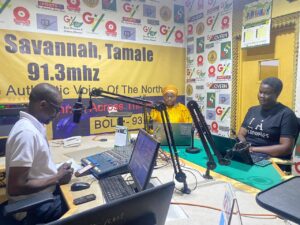
WOMEN , LAND RIGHTS AND FOOD SECURITY IN NORTHERN GHANA
In many communities, women face discrimination when it comes to land ownership and use. This isn’t just unfair, it hinders food security for everyone.
A recent IFPRI Discussion Paper (Gender inequalities in ownership and control of land in Africa: Myths versus reality | IFPRI : International Food Policy Research Institute) highlights how unequal land rights in Africa hold back development. But when women have secure land rights, they gain power! They can decide what crops to grow, how to manage the land, and how to use the harvest – all contributing to a community’s food security and economic well-being.
This message was powerfully echoed by a Songtaba community leader and a gender equality specialist at a recent radio session at the GBC Radio Savannah 91.3 MHz, Tamale. They emphasized that giving women access to land is critical, not just for families, but for the entire nation’s long-term sustainability.
The program delved into the recently enacted New Land Act, highlighting how it promotes:
● Equal Access to Land Ownership: Women can now own land jointly with spouses and inherit land from deceased parents.
● Securing Land Ownership Titles: The Act clarifies the process for women to obtain land titles, ensuring their rights and protecting their interests.
● Fair Inheritance Rights: Traditional practices that excluded women from inheriting land are addressed, guaranteeing women their rightful share.
The discussion went beyond legal aspects, emphasizing the crucial link between women’s land rights and food security:
● Women as Food System Powerhouses: From production and processing to marketing and consumption, women are deeply involved in all stages. Secure land ownership empowers them to invest in better farming practices, leading to:
○ Increased Food Production: Improved yields translate to more food for families and communities, boosting food security.
○ Greater Household Income: Women’s participation in the entire food value chain, from post-harvest activities to sales, generates additional income for themselves and their families.
Men as Allies for Change: The program addressed the importance of men’s support in achieving gender equality regarding land rights. By advocating for women within families and communities, men can champion the New Land Act’s provisions.
Economic Benefits of Women Owning Land: Secure land ownership unlocks a wave of positive economic outcomes:
● Increased Productivity & Investment: Secure land titles allow women to invest in better seeds, fertilizers, and irrigation, leading to higher yields. They can also access credit for these improvements.
● Improved Decision-Making: Studies show women reinvest a larger portion of their income back into their households and agricultural production, fostering a sustainable cycle.
● Focus on Food Security: Women farmers often prioritize growing nutritious food for their families and communities, strengthening food security.
● Job Creation & Income Generation: Secure land ownership empowers women to diversify agricultural activities, potentially creating jobs through:
○ Diversification: Raising livestock, cultivating high-value crops, or starting processing/marketing businesses create new income streams.
○ Increased Labor Needs: Expanded production may require hiring additional workers, benefiting family members and the local community.
○ Market Participation: Secure land rights allow women to sell their produce more actively, stimulating the local economy and creating opportunities for those involved in the agricultural supply chain.
By empowering women through secure land rights, we empower entire communities! Let’s continue this important conversation and work towards a future where everyone thrives.
#LandRights #WomenEmpowerment #FoodSecurity #NorthernGhana #GenderEquality
SOAP MAKING TRAINING IN KUMBUNGU
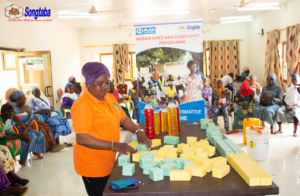
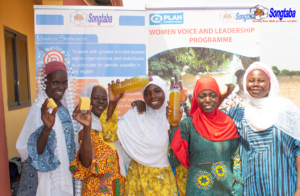
Empowering Women in Kumbungu: A Soap Making Success Story! 🇬🇭
At the core of what we do at songtaba is women’s economic empowerment, we organized a soap making training program for women in Kpegu, Zugu, and Gupanarigu communities within the Kumbungu district under the Women Voice and Leadership Program in partnership with Plan International.
This initiative aimed to equip women with valuable skills and knowledge to produce their own high-quality soaps. Over the course of the program, participants learned the entire soap making process, from understanding the properties of different oils and fragrances and how to present their finished goods.
This initiative was to support their group initiatives in generating income for the group to increase their capital.
We’re excited to see how these women continue to thrive and empower others in their communities! #Kumbungu


